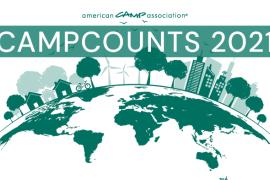That question was one that I and my collaborator Leila Bighash sought to help answer in our recent study, recognized at the ACA National Conference with the Eleanor P. Eells Award for Research in Practice. Gender-inclusive camp housing has been a notable topic of discussion in recent years, as transgender and nonbinary youth have become increasingly visible in camp spaces and may not fit within housing separated along a strict male-female binary.
In collaboration with Camp Brave Trails, which hosts a lesbian, gay, bisexual, transgender, and queer (LGBTQ) youth leadership camp in California and Maryland, we administered post-camp surveys to campers attending the program in summer 2017, asking campers which peers they considered close friends, and to indicate whether these friends also attended Brave Trails. We then examined the resulting network of 111 campers, using social network analysis techniques. Results showed that campers were six times more likely to be friends with peers in their assigned, gender-inclusive cabins, while gender identity had no significant influence on campers’ friendship patterns.
Our findings contrast with prior research that has found a tendency among youth, including those who identify as LGBTQ, to develop friendships with people of their same gender identity. The results of our project suggest that the outcomes in prior studies may be more so due to communication constraints from gender-segregated physical spaces and social practices (e.g., school housing, single-sex schools, bathrooms, locker rooms, sports teams) that can be pervasive during the time in which youth develop friendships, rather than due to youth having a notable preference for same-gender friends. This highlights the potential for emerging gender-inclusive spaces — like camp cabins — to integrate youth friendships across gender identities.
While our study perhaps raises a number of questions that have yet to be answered, such as whether similar patterns occur when campers not identifying as LGBTQ reside in gender-inclusive camp housing, we hope our work contributes to the ongoing conversations about camp housing and recommendations to integrate camp activities traditionally divided by gender.
Traci Gillig is an assistant professor at Washington State University and has volunteered in the camp industry in a variety of roles, including utility and administrative staff and cabin counselor.
The views and opinions expressed by contributors are their own and do not necessarily reflect the views of the American Camp Association or ACA employees.



